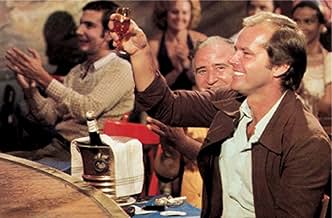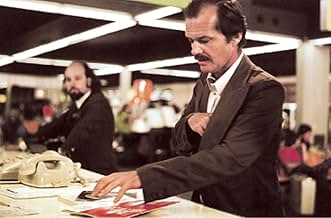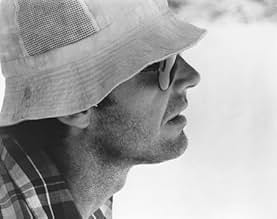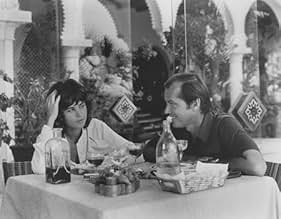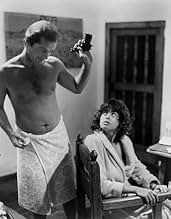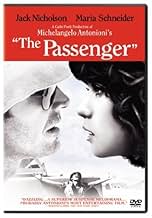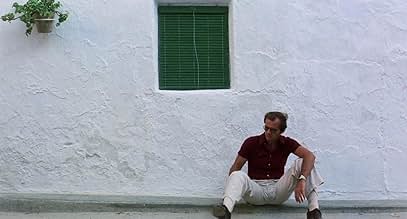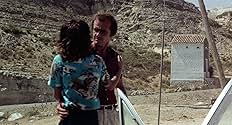Um correspondente de guerra frustrado, incapaz de encontrar a guerra que lhe foi pedido para cobrir, toma o caminho arriscado de apropriar-se da identidade de um conhecido traficante de arma... Ler tudoUm correspondente de guerra frustrado, incapaz de encontrar a guerra que lhe foi pedido para cobrir, toma o caminho arriscado de apropriar-se da identidade de um conhecido traficante de armas morto.Um correspondente de guerra frustrado, incapaz de encontrar a guerra que lhe foi pedido para cobrir, toma o caminho arriscado de apropriar-se da identidade de um conhecido traficante de armas morto.
- Direção
- Roteiristas
- Artistas
- Prêmios
- 5 vitórias e 2 indicações no total
- Robertson
- (as Chuck Mulvehill)
- Hotel Clerk
- (não creditado)
- Murderer's accomplice
- (não creditado)
- Cameraman
- (não creditado)
Avaliações em destaque
From the very first sequence, this is a starkly shot film with a very unique visual signature to everything you see. A desolate, exotic locale for a movie: the North African desert. But this desert setting is perfectly in accord with the refreshing cinematic technique of Michelangelo Antonioni, who always stressed economy. Just as in his other works, there are no unnecessary ornaments or frills here. He introduces us to the strange, existential story in this film, and its odd, solitary, lead character-- in as clean, pure, and undiluted terms as possible. The principle here is that 'less is more'.
Some people really dislike this about Antonioni. He uses his camera in such a quiet way; and there is just this single, very terse figure/ground relationship which is the focus of his attention. But I think he knows that character stands out with more relief when its set against a minimalist background. Here, because characterization is channeled through Jack Nicholson, (far better even than in 'Blow-up' with David Hemmings) its more than enough. The brevity and scarcity in the film funnels you straight into Nicholson's awesome talent. We are along with him for the ride.
The plot starts out cryptically and simply, with very little explained about the man the camera spends so much time on. Jack Nicholson is a reporter named David Locke, and he is covering an African civil war. But beyond this, you must infer most everything else about him from just what you see-just by observing his behavior, and nothing else. There is scant dialogue of any kind. The depth of Nicholson's character is conveyed in miniscule components, parsed out after long intervals. His overall demeanor is weary, frustrated, sullen; the typical traveler who cant get good service. But he is also dispirited with his mission and in a way, despondent about his whole future and way of life.
Then suddenly, he sheds his persona and takes on someone elses'. He is staying in an isolated hotel and a man in the next room dies accidentally-and Nicholson decides to trade identities with the corpse; leaving the hotel with this new identity and letting everyone think it is he who has died. It's the personal reasons for this act, which Antonioni explores throughout the rest of the movie: the consequences and responsibilities incurred when you gamble upon coincidence and invest in random chance.
(II)
'Passenger' follows the progress of a man through a personal crisis; an identity transformation. The film is split with a Doppler-shift down the meridian of the identity theft Nicholson commits. His problems after this act consist of trying to make sure his ex-wife and employers continue to assume he is dead; and deciding how much of the false man's life and business to play at.
With the plot as its laid out this way, we might not ever really ever know the full reasons why Locke exchanged personality for that of another. But Antonioni adds some really clever flourishes: since Locke was a news journalist, the video interviews he conducted up to the point of his 'death' are available both to the people who begin to hunt him, and to us. We actually see more of Locke revealed in these flashbacks than we do in real-time. It adds just the right note. We get a better idea of the reasoning behind this bold act, why he casually gave up his whole history on a whim.
In his assignments up to this side trip to North Africa, we discern that Locke is dissatisfied with 'the rules' governing his profession. He is a talented observer, and wants to be a good reporter. But he finds all the news he gathers is in a way, pre-constrained by cultural filters. Its not raw enough, instead, its already been processed for him. In other words, he is never getting the real story; as long as he is a reporter, people frame their information for him as a reporter. As long as he is an Anglo, people treat him as an Anglo.
But after the identity-shedding transformation, he is free; and he has the time of his life. Returning to London, Locke amusedly begins playing the role of the dead man: keeping his engagements, carrying out business deals. Theres no accountability; he is pretending to be someone else. Only one thing: the dead man was an arms dealer and Nicholson is getting into deep trouble by masquerading this way. His philosophical pleasure may be cut short sooner than he expects. He doesnt see the trouble coming his way, but we do. Its a sort of combination of film noir and road-trip movie here; and it works.
(III)
Things begin to unravel. Shady customers start to dog his footsteps. Growing increasingly edgy, as he continues to follow the strange itinerary, Nicholson hooks up by coincidence with a young architecture student backpacking through Spain (well-played by petite, dusky, sensual Maria Schneider). They're an odd pair; but their joining forces makes one of a most intriguing screen romances of the period. She isn't given much to do in the screenplay, but makes a wonderful calming presence to the brittle Nicholson. Her character insists that Locke should, in all rationality, continue his journey--she is rigorous about principles. Locke acquiesces and he continues on, down along the coast of Spain towards Africa again, on his fool's errands, to meet his fate.
I wont expose any more of the plot. But I will say the final sequence of this movie is extremely startling and powerful. I had never even heard about it; in my opinion it should be talked about much, much more. Totally daring and innovative. Antonioni really shows what he can do here-you simply have to see it.
There are some flaws, yes: a few of Antonioni's flashbacks come off lame and awkward- too abrupt. They're really irksome. And there is a sloppy element in the final denoument, which I still cant understand: the drivers school vehicle. I yearn for the movie to be re-cut to remove these failings. But its still very satisfying as is.
(IV)
The bottom line here is that Nicholson has, in this film, a showcase for his talents like few other projects I have seen him in. This film was made in 1975, just a year after 'Chinatown' and the same year as his cameo in The Who's `Tommy' and his lead role in Milos Foreman's `One Flew Over the Cuckoo's Nest'. Jack is quite young, fit, and good-looking when he made this film. Its rewarding to remember him as he was then, before he both let himself go somewhat physically, and also began playing so many 'sick, horny focker' roles. This is one of the highlights of his entire life's work, imho. Easily as memorable as Jake Gittes or MacMurphy.
Jack is careful to do a good job in this movie--perhaps at this point in his career, he was still worried about major goof-ups. Its definitely prior to the point where he began to 'coast'. It looks like he took this film seriously--and probably enjoyed it immensely. Anyway, what other actor do you know today that could walk away with a difficult role like this one; an actor who would be as supremely interesting to us (as Nicholson is, in many scenes in this film) doing not much of anything for long moments at a time?
I doubt even DeNiro could have succeeded--he would have played it too 'tough-guy' and added too much gesture. Its Nicholson's laconic, dry twang, his sardonic gestures and those bored, squinty, seen-it-all eyes, that makes it work. There is a world-weariness about him in this performance that is quite special. The weight of past experiences exudes strongly from him; and its just what Antonioni needed. This quality defined him for this role like no other contemporary actor of his time.
Anyway, in this flick, you know he is doomed but you aren't really sure how Antonioni is going to do it. Antonioni creates massive tension with that very economical, severe camera style and almost no music. There are many scenes where the only sounds are the background noises from the environment itself; you can practically see Nicholson's sweat, hear his breath, and feel his pulse. Nicholson, surely very aware of this tight focus on him, maintains a rigid grip on his character throughout the film.
He isn't at all cocky--his special trait is his vulnerability. Nicholson always seems tough on the outside, but also as if he can still be hurt (as we see here, and in Chinatown as well). Its a vulnerability very like Bogart's in 'Casablanca'. In fact, if this film had been made in a previous generation, (as Gene Siskel once claimed) there would have been no there actor besides Bogart who could have even pulled it off. But no matter what: its great to see Nicholson on his own, competing with no other strong castmembers, just cruising along as a lone, insecure American among hostile and unfriendly foreigners.
His characterization is superbly restrained and un-showy; his gestures and expressions are as bland as possible; and there are no wildly quotable lines or speeches (any Nicholson fan should view this film for this reason alone). Anyway, by the end of the flick, you are positioned so closely alongside Nicholson--so wrapped up in his fate--that the brilliant, low-key finale can take you by surprise and it leaves a terrific poignancy.
In short, there are many reasons to like this film. I heartily recommend it. Its easily the best movie I have seen in some time. Its essential for appreciating both Nicholson and Antonioni. I encourage you to rent this movie on VHS as I am sure you will relish it as well.
Some may find the opening twenty minutes of the film, where there is virtually no dialogue, hard-going but this perfectly illustrates the sparse and confusing environment of the North African desert where the film begins. We are also treated to a marvellous scene between Locke and the man whose identity he later assumes where a tape recording and flashback are ingeniously merged into one and then separated again. Antonioni creates a mood that is almost indefinable throughout, a kind of hollow detachment which is exactly the perspective that Locke has on the world which has gradually worn him down yet the director still manages to conjure up power and simple romance between Locke and the girl he meets who is played by Maria Schneider. The film was not a hit at the box-office which is not surprising considering it's uncommercial style but artistically and cinematically it is a triumph of innovation.
Despite its power and polemic against journalism, Professione: Reporter is also an understated movie from start to finish, made for a grown-up audience. Nothing is spelt out for you. However, the movie is strewn throughout with powerful and evocative visual clues, so it's nonetheless up to you as an attentive viewer to pick up (the early scene of Locke's Jeep getting stuck in the African desert sand, anyone?), or even soak them up unconsciously. As with all Antonioni, every shot in this movie is worthy of analysis and admiration. Bergman once said about the Italian that he could create some arresting individual images, but was incapable of stringing them all together in the sequence of a palatable movie: sorry Ingmar, old man - as much as I feel in awe of your craft, you're talking nonsense, here. However, I can't believe Antonioni once had the cheek to say he improvises each scene as he goes along (see his IMDb quotes page). There isn't a chance in hell these meticulously crafted, immaculately framed and composed movies are not also carefully premeditated. Clearly, Antonioni was trying to start a myth about himself along the lines of the one about Mozart composing his music straight onto the page, as dictated by God. In Professione: Reporter, I was especially in awe of the sequence involving the single long take from the window of Locke's last hotel room in an unnamed, dusty Spanish village. Regarding Maria Schneider, it truly is a shame she wasn't the star in a greater number of successful movies. Her ambiguity makes it very difficult to keep one's eyes off her when she's on screen. She looks like a cross between a boy, a girl and something cutely ape-like (I mean it in a good way!).
I would like to warn viewers of the inclusion of footage of a real execution - again, this was a film within the film. Personally, I found it very disturbing, which is why I'm mentioning it here.
"Professione: reporter", to me, belongs to the most interesting period of Antonioni's career (between the second half of the Sixties and the first of the Seventies). Because in these years the Italian director made his most accessible works: "Blow Up" (1966), "Zabryskie point" (1969) and "Professione: reporter" ("The Passenger", 1974). These films contain more action and more situations. They are neither more commercial nor more mainstream, but they talk about an adventure or a dream.
A journalist in North Africa switches the identity with a dead man who looks like him. He does this to escape from his life and for living a more interesting one. But he'll pay for his choice...
It's difficult to say, but this Antonioni movie (with his recurrent themes and -in a smaller way- times) has a lot of suspense, if I can say so. Once you begin to watch it, you can't give up. The funny thing is that nothing really big or special happens: sometimes it seems a road movie, sometimes it is a typical Antonioni analysis of the society. Jack Nicholson -how young he was at that time!- fills the film, his performance and his expressions are brilliant. It's also interesting the chemistry with Maria Schneider, the lady of "The last tango in Paris" -an actress who never got the fame and the recognition she deserved.
Cinematography is fantastic. But, above all, the big surprise of the film is the final shot: a 7-8 minutes take without cuts, absolute amazing. It's not describable, it's a must!
Você sabia?
- CuriosidadesWhen Michelangelo Antonioni received his honorary Oscar in 1995, the Academy asked Jack Nicholson to present it to him.
- Erros de gravaçãoThere are a couple of inaccuracies in the displayed details of Locke's Air Afrique air ticket that was evidently issued in Douala, Cameroon in August 1974. The name of Fort-Lamy (Chad's neighboring capital city) became N'djamena in early 1973, and Paris is written in Italian ("Parigi") which would not have occurred in French-speaking Douala.
- Citações
The Girl: Isn't it funny how things happen? All the shapes we make. Wouldn't it be terrible to be blind?
David Locke: I know a man who was blind. When he was nearly 40 years old, he had an operation and regained his sight.
The Girl: How was it like?
David Locke: At first he was elated... really high. Faces... colors... landscapes. But then everything began to change. The world was much poorer than he imagined. No one had ever told him how much dirt there was. How much ugliness. He noticed ugliness everywhere. When he was blind... he used to cross the street alone with a stick. After he regained his sight... he became afraid. He began to live in darkness. He never left his room. After three years he killed himself.
- Cenas durante ou pós-créditosLeo, the MGM lion, which normally precedes the opening credits of MGM movies, has been supplanted by "BEGINNING OUR NEXT 50 YEARS". Leo then returns in the center with "GOLDEN ANNIVERSARY" on either side of it.
- Versões alternativasSeven minutes were added to the 2005-2006 re-release version, including a brief shot of a nude Maria Schneider in bed with Jack Nicholson in the Spanish hotel.
- ConexõesFeatured in Z Channel: A Magnificent Obsession (2004)
Principais escolhas
- How long is The Passenger?Fornecido pela Alexa
Detalhes
- Data de lançamento
- Países de origem
- Central de atendimento oficial
- Idiomas
- Também conhecido como
- The Passenger
- Locações de filme
- Fort Polignac, Algéria(desert scenes, setting: Chad)
- Empresas de produção
- Consulte mais créditos da empresa na IMDbPro
Bilheteria
- Faturamento bruto nos EUA e Canadá
- US$ 620.155
- Fim de semana de estreia nos EUA e Canadá
- US$ 24.157
- 30 de out. de 2005
- Faturamento bruto mundial
- US$ 769.503
Contribua para esta página




